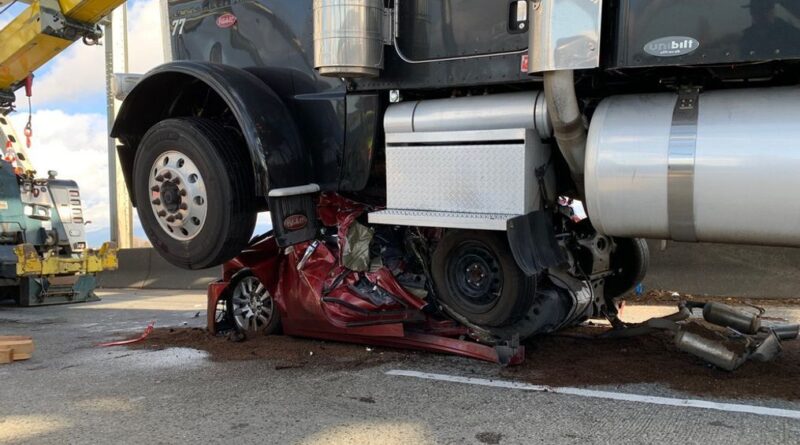Controversy Erupts Over Influx of Non-English Speaking Truckers
For several years, the world of American trucking has experienced a significant shift, as many veteran truck drivers express concerns over the incursion of inexperienced, low-wage immigrant drivers who have limited English abilities. Once, United States federal regulations had mandated that all commercial motor vehicle operators exhibit a strong command of the English language, allowing them to interact effectively with the public, interpret traffic signs correctly, and maintain accurate report records. However, enforcement of this requirement was relaxed under a recent administrative change by the Department of Transportation, contributing to an influx of non-English speaking truck drivers now seen nationwide.
Even though this regulation has since been re-implemented, industry professionals warn that the effects still linger. They decry a system that seems susceptible to exploitation by businesses eager to capitalize on inexpensive labor from migrant workers. Being able to pay these workers less has resulted in compelling headlines across the country, recounting tales of deadly accidents caused by migrant commercial drivers, some of whom are suspected to be residing in the country illegally.
One such incident brought to light involved a truck driver making an unlawful U-turn on a Florida highway. His tractor-trailer blocked all lanes of traffic, leading to a horrific collision that resulted in three fatalities. This incident added fuel to the growing condemnation from long-standing truckers. They contend this is not just a result of lax regulations, but also stems from the corporate pressure to minimize labor costs, often at the expense of safety.
Investigations following the Florida incident revealed that the driver in question had secured a Commercial Driver’s License through the California Department of Motor Vehicles, according to federal authorities. However, a subsequent English Language Proficiency test conducted by the Federal Motor Carrier Safety Administration post-accident found that the driver was hardly proficient. Of the 12-question verbal exam, the driver answered only two correctly. Furthermore, he was only able to correctly recognize one out of four highway traffic signs.
A separate incident involved a suspected illegal immigrant driver of a box truck in Maine. The truck veered off the road, severely damaging the vehicle and leaving the two passengers requiring medical attention. Upon interacting with the driver, the responding state trooper grew suspicious due to the driver’s inability to communicate clearly. The driver presented a Colombian passport and a New York driver’s license as identification.
Upon further inspection, it was confirmed by the Department of Homeland Security that the driver was indeed a migrant who had overstayed his visa. These instances point to a multifaceted problem within the industry. It’s not merely underqualified foreign drivers at the wheel, but a deeper issue of flawed regulations and unscrupulous business practices that together create hazardous conditions on our highways.
The situation, unfortunately, is far from being a new phenomenon. There have been numerous incidents over the years involving drivers with limited English proficiency causing catastrophic accidents. A sports utility vehicle in Wyoming became one more fatal collision site when a truck driver crashed into an already existent accident scene, resulting in the death of an emergency medical technician and damaging an ambulance.
Allegedly, the driver had been attempting to overtake slower vehicles within the wreckage, leading to the tragedy. The court found him guilty on three criminal charges, namely, aggravated vehicular homicide, aggravated assault, and failure to make way for emergency vehicles. This incident paints a solemn picture of the dangers posed by drivers operating heavy-duty vehicles without adequate language proficiency and road safety skills.
The Florida tragedy sparked even more controversy. Threats of withholding federal funds emerged, directed at three separate states. All three states were issued an ultimatum: Enforce English Language Proficiency regulations for commercial vehicle drivers or face substantial withdrawals of financial support. These states now face a ticking clock to confirm compliance or risk forfeiting millions in funding.
While administrative bodies and individual states tussle over regulatory enforcement on the ground level, discerning trucking professionals perceive large-scale transportation companies as the true source of the disruption. They indicate that these corporate monoliths maintain an effectively ‘unlimited capacity.’ Consequently, their freight hauling costs are significantly underrated compared to ethically operating companies, creating a grossly uneven playing field.
The everyday truckers are not the only individuals raising alarm over unprincipled corporate greed permeating the industry. The American Trucking Associations, a body representing over 37,000 motor carriers and suppliers nationwide, has beseeched the Department of Homeland Security to take action against companies engaging in cabotage.
Cabotage, a tactic wherein unauthorized foreign drivers transport cargo within the U.S. on a point-to-point basis, substantially undermines the wages of American truckers. While this practice increases profits for companies, it simultaneously devalues the labor of domestic truckers.
In essence, cabotage significantly boosts profits for the operators while slashing pay for American truck drivers. This system creates a highly beneficial financial situation for companies at the direct expense of domestically-based truckers, whose earnings continue to be steadily eroded.
The exploitative conduct of these companies and the absence of stringent regulatory enforcement generate a cynical outlook for the future of American truckers. The bottom line in a heavily competitive industry appears to be driving an unscrupulous quest for profits at the cost of safety and fair wages.
The larger narrative of this issue is that under the current industry norms, it is the American trucker who bears the brunt. As critics explain, the professionals who have devoted their lives to trucking are progressively losing out in an industry that seems willing to compromise safety, quality, and fair compensation for increased profits.

